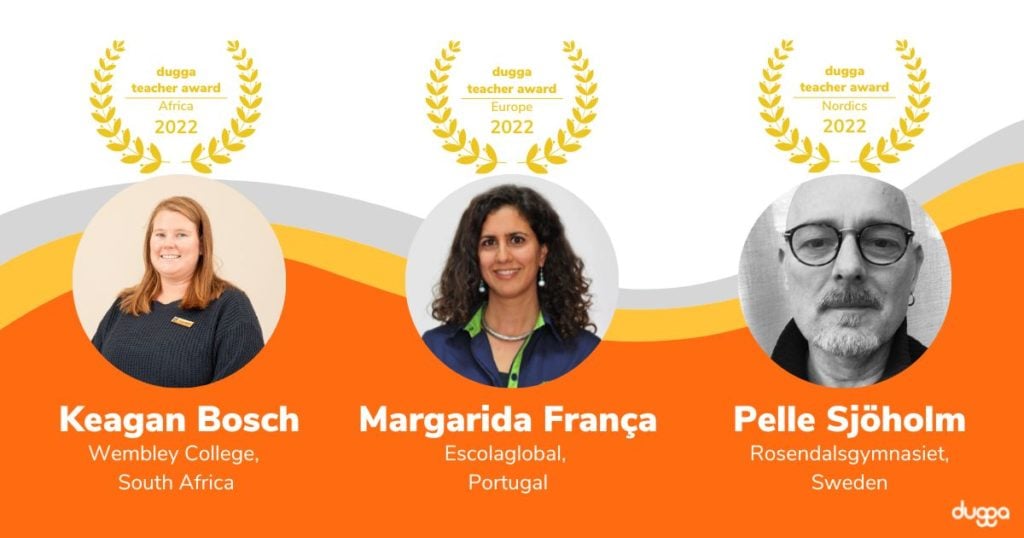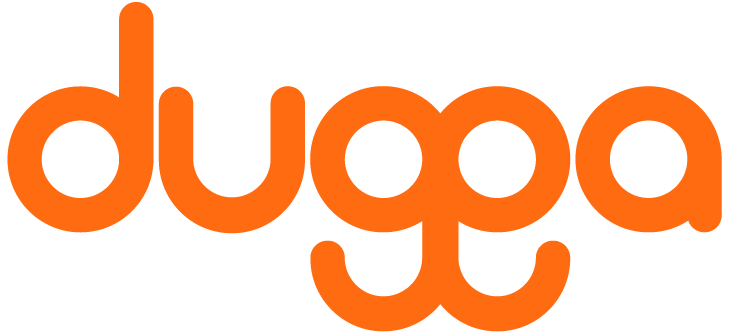
The Jury has during their annual meeting selected the winners of the Teacher Award 2022 based on their excelling efforts in driving the digital transformation at their schools to increase quality and equality in learning and assessment. They are inspiring other teachers to improve learning outcomes through digital assessment. The winners are representing different regions of the world, where each teacher hero has made an impact locally with their teaching and assessment of pupils and students.
CRITERIA: Teacher heroes who are:
- driving the digital transformation to increase quality and equality in assessment
- making their school a digital pioneer in assessment to improve learning outcomes
- inspiring and motivating other teachers to reach pedagogical excellence with the help of digital assessment
Winners of the Dugga Teacher Award 2022: Keagan Bosch, Wembley College, South Africa, Margarida França, Escolaglobal, Portugal and Pelle Sjöholm, Rosendalsgymnasiet, Sweden.
Read the interviews with this year’s winners below.
In your opinion, what is the best thing about being a teacher?
Providing a safe space for students, creating an environment where they can be themselves and ask questions without the fear of being shut down. Teenagers already feel highly self-conscious on a daily basis, and I enjoy creating an environment where they can leave that at the door. I love being able to teach them to question norms and do their own extra research on topics they may be a little more interested in. – Keagan Bosch, Wembley College, South Africa
Knowing that sometimes we can make a difference in a student’s life or influence them positively. Every day I learn from my students and whenever they thank me or appreciate my work it is extremely rewarding. – Margarida França, Escolaglobal, Portugal
Undoubtedly, the students. There is nothing better than feeling that you are contributing to society and their future. – Pelle Sjöholm, Rosendalsgymnasiet, Sweden
What/who inspired you to become a teacher?
I had two phenomenal teachers in high school, Mrs Davidson and Mrs Maneli, my geography and history teachers. They inspired my love of learning, the environment and history. They both have a huge heart for children and a passion for driving education. They helped me realize that I wanted to be a teacher too. I have learnt so much from them. – Keagan Bosch, Wembley College, South Africa
What always inspired me was not teaching, but experimentation and laboratory activity. That led me to microbiology and later to food safety. That was the reason that brought me to escolaglobal®, where I was challenged to reconcile food safety and education. I embraced the challenge 14 years ago and today I can’t imagine myself as a science teacher. – Margarida França, Escolaglobal, Portugal
I started as a sub right after high school and the job kind of seemed to agree with me. If I couldn’t be a professional musician, teaching was the only other career I could imagine for myself. It’s very much like a performance, after all. – Pelle Sjöholm, Rosendalsgymnasiet, Sweden
When you were a child, who were your idols and why?
I never had idols, but I always admired my father. It was from him that I inherited my taste for science and from him that I learned so much, even though he was not a teacher by profession. There was always something about animals or nature to teach us. He always spoke passionately and seemed to be an inexhaustible source of wisdom. Undoubtedly, these moments were decisive for me to become the teacher I am today. – Margarida França, Escolaglobal, Portugal
David Bowie. His motto was “do what you want, wear what you like and be who you want to be”. The fact that he broke the norms was truly inspiring. – Pelle Sjöholm, Rosendalsgymnasiet, Sweden
What is your favourite feature of Dugga?
I love being paperless, it has saved me many hours of walking to the printing too. Time that I can now spend doing planning or other school things. I noticed how much faster Dugga made my marking process, especially with the mark by question setting for geography. I cut down my marking time by at least half. The active time feature is also great, if a student started a test a little but late because of internet connection or something else, Dugga ensures that they still get their full test time. – Keagan Bosch, Wembley College, South Africa
It’s easy to use, very versatile and intuitive. The variety of types of questions and the possibility of giving general and individual feedback on each question is an asset. The “general feedback” option allows you to provide all students with the correct answer and grading criteria. Individual feedback allows you to specifically indicate to the student what they failed to correct. – Margarida França, Escolaglobal, Portugal
There are many, from auto-corrected tests to anonymous marking and grading (which is underrated), but also the Dugga Team’s open, innovative mindset to continuously update and develop the platform. – Pelle Sjöholm, Rosendalsgymnasiet, Sweden
How has Dugga changed your daily work?
It has made assessments incredibly easy, it is much easier to set in tests and attach diagrams and inserts. I have saved a lot of time in marking and doing reports. It also helps to send the students test straight to their laptop for them to view, it makes corrections much easier. It really did make all my planning and marking more stress free. Because of Dugga’s scheduling settings, if students were absent or needed to write tests from home, this could be done very easily. – Keagan Bosch, Wembley College, South Africa
Dugga made it possible to reduce the cost of paper. I no longer run the risk of losing my students’ work and I can easily correct work without having to sit at my desk. – Margarida França, Escolaglobal, Portugal
The main thing is all the time I can save. Some exams are autocorrected and others, like novel analyses with essay questions, just get done faster. I use this time on the essays, for which I never seem to have enough! I also really appreciate the anonymous grading in Dugga. Today I cannot think of a fairer way to grade exams other than anonymous grading. My students highly appreciate this way of being graded. – Pelle Sjöholm, Rosendalsgymnasiet, Sweden
How have the many different question types contributed to how you can assess your students/pupils?
For history and geography seniors, I used a lot of essay questions which gave the students spell check and word count to help them while they answered questions. For my junior classes, I used a lot of the short question modes like match the column and true and false, which the students enjoyed. I could also add different answers to my memo after the students had written a test. – Keagan Bosch, Wembley College, South Africa
In my discipline, natural sciences, the need for different question typologies is extremely important. The possibility of having questions that allow the caption of images, for example, is one of those cases. – Margarida França, Escolaglobal, Portugal
The many different question types have saved a lot of time for me as well as my colleagues. My subjects are English and Swedish and I usually use around five question types such as Essay, MCQ and Correct Answer. This has been very sufficient and time saving for me. For my colleagues who teach Natural Sciences, they use many other question types such as Right Place, Order and Match. Therefore, this diversity of question types is highly appreciated at my school. – Pelle Sjöholm, Rosendalsgymnasiet, Sweden
